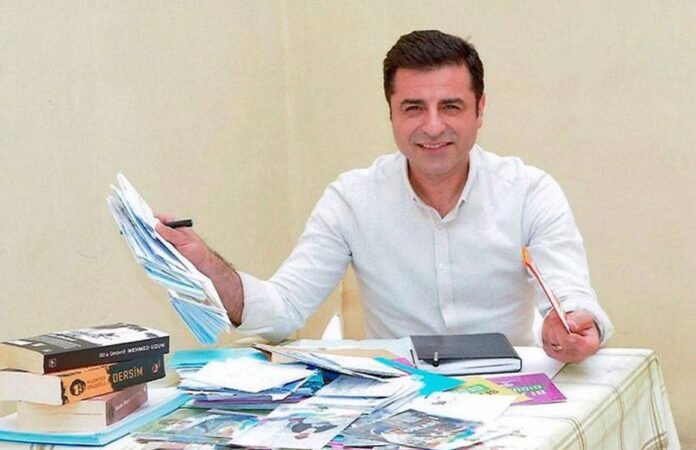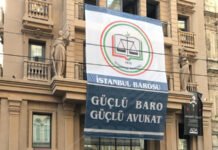The European Court of Human Rights (ECtHR) has rejected an appeal by the Turkish government to refer to the Grand Chamber its ruling that called for the immediate release of Kurdish politician Selahattin Demirtaş, effectively finalizing the decision, Turkish media reported on Monday.
The ruling prompted widespread calls from politicians, human rights advocates and lawyers for Demirtaş’s release. His lawyer, Mahsuni Karaman, announced on Wednesday that he had submitted a petition to the Ankara Regional Court of Justice for his release.
Turkey filed its appeal on October 8, challenging the Strasbourg court’s July 8 judgment that found Ankara in violation of the European Convention on Human Rights (ECHR). Building on its 2020 ruling, the court held that Demirtaş’s pretrial detention for more than four years at the time “pursued an ulterior purpose, namely that of stifling public debate and limiting the scope of democratic debate.”
Demirtaş, a prominent Kurdish politician, former leader of the pro-Kurdish Peoples’ Democratic Party (HDP) and vocal critic of President Recep Tayyip Erdoğan, was initially arrested on November 4, 2016 on charges including “dissemination of terrorist propaganda” and alleged links to the outlawed Kurdistan Workers’ Party (PKK). In May 2024 Demirtaş was sentenced to 42 years in prison for allegedly undermining state unity during the Kobani protests — demonstrations that erupted across Turkey from October 6 to 8, 2014, when the Islamic State in Iraq and the Levant (ISIL) laid siege to the Syrian Kurdish town of Kobani. Particularly intense in the predominantly Kurdish southeastern provinces, the protests resulted in 37 deaths.
Political observers said the Turkish court’s denial of Demirtaş’s release after the July 8 judgment and the government’s subsequent appeal has fueled skepticism over the Turkish government’s sincerity in pursuing peace with its Kurdish population. Although the National Solidarity, Brotherhood and Democracy Commission, a parliamentary body established to oversee the peace efforts, has begun its meetings, President Erdoğan has yet to take concrete steps toward political reform following the PKK’s decision in February to disband and lay down arms. The pro-Kurdish Peoples’ Equality and Democracy Party (DEM Party) has demanded that the commission hear Öcalan directly.
The ECtHR has previously ruled three times, in 2018, 2020 and 2025, that Demirtaş’s detention violated his rights, concluding that Turkish authorities had sought to silence political opposition. The latest judgment ordered Ankara to pay Demirtaş compensation totaling more than €55,000 in damages and legal costs.
Following the decision Demirtaş shared a handwritten message on X, emphasizing that while the court’s ruling is important and legally binding, “for 86 million citizens the law of brotherhood is more important than everything else.”
The DEM Party also issued a statement on X demanding the release of all its imprisoned members, notably Demirtaş and Figen Yüksekdağ.
Erinç Sağkan, president of the Union of Turkish Bar Associations (TBB), said the decision revealed that political interference had tainted the judicial process and eroded the guarantees of impartiality and judicial independence. Sağkan stressed that the ECtHR ruling must be implemented without delay.
The Human Rights Association (İHD) also issued a statement warning that Demirtaş’s continued imprisonment narrows the space for democratic politics in Turkey, undermines the public trust in justice and harms hopes for a democratic solution to the Kurdish question.
The so-called Kurdish question, a term prevalent in Turkey’s public discourse that refers to the demand for equal rights by the country’s Kurdish population and their struggle for recognition, is characterized by continuing clashes between the PKK and Turkish security forces. More than 40,000 people, including 5,500 security force members, have been killed in four decades of fighting between the Turkish state and the PKK.
The Parliamentary Assembly of the Council of Europe (PACE) also adopted a resolution on April 9 urging Turkey to fulfill its obligations under the European Convention on Human Rights by implementing key judgments of the ECtHR.
International observers say the Turkish judicial system has suffered “irreversible damage” during the more than two-decade-long tenure of the Justice and Development Party (AKP), particularly after a coup attempt in 2016.
Confirming the weakening of the Turkish judiciary, Turkey was ranked 118th among 142 countries in the World Justice Project’s 2025 Rule of Law Index.















